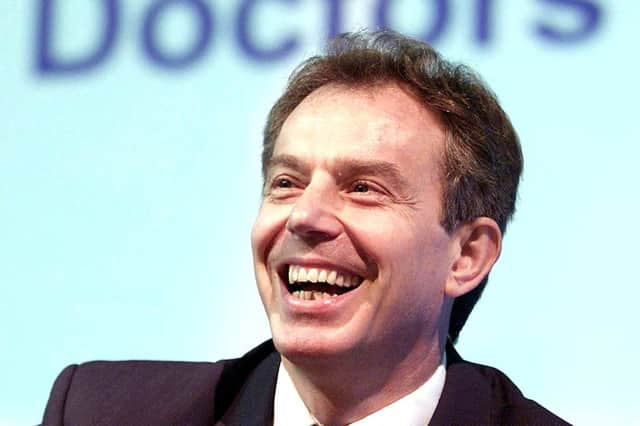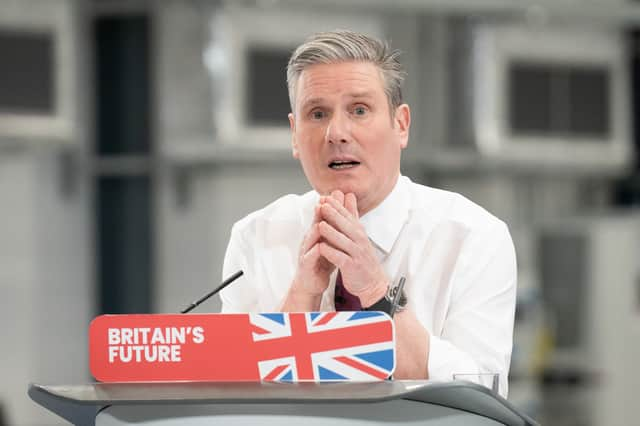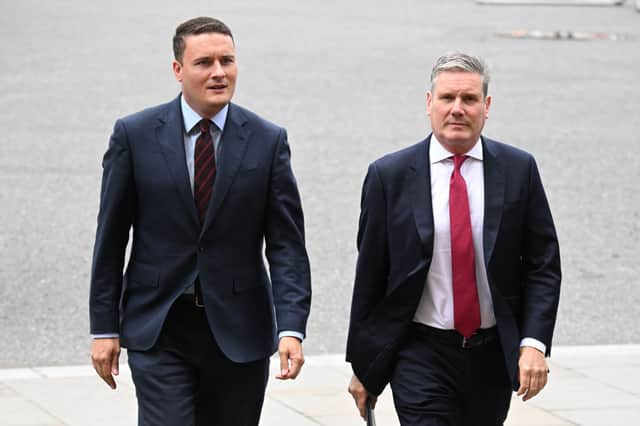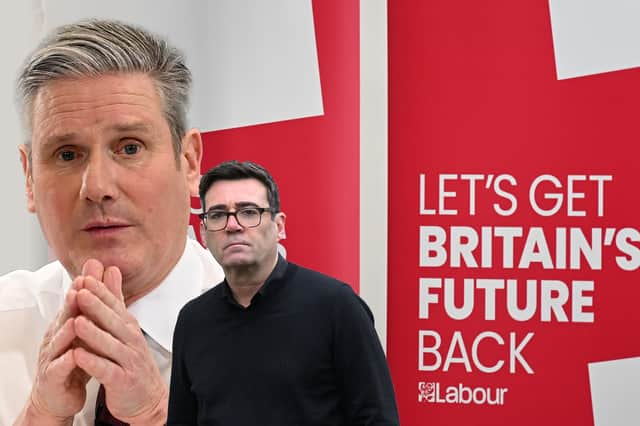Labour long read: polling shows Keir Starmer can afford to be more brave and radical
and live on Freeview channel 276
In January 2000, almost 14 years ago to the day, the then-Prime Minister Tony Blair went on the BBC’s flagship Breakfast With Frost programme and promised to raise NHS spending to European levels.
Current Mayor of Greater Manchester, Andy Burnham, who was preparing to stand in the 2001 general election, still remembers that moment: “I remember gulping a little bit. There was an honesty that there would need to be a tax increase to pay for the NHS. I think back to that - the public are ready to be given a sophisticated argument about how things need to change.”
Advertisement
Hide AdAdvertisement
Hide AdBurnham, who has become one of Labour’s most radical thinkers while in regional government, believes that Starmer and the Shadow Cabinet will not be able to avoid the issue of tax in the run up to the general election. “It’s easy for me to say ,” the former Health Secretary says, “the front bench are in a different position, they’ve got an election to win.
“This country is broken, everything feels like it’s going backwards. If we’re going to get some hope flowing around the place … we do still have to start saying how are we going to get the investment up front to start rebuilding and repairing things.”


So far, apart from Labour’s £28 billion-a-year green energy plan, which now might not be spent over an entire Parliament, Starmer has been reluctant to make big policy announcements or investment promises, even with the NHS. Every commitment must be subject to Rachel Reeves’ fiscal rules, which include not borrowing to fund day-to-day spending and reducing debt as a share of GDP.
Starmer reiterated these in his first big speech of 2024 on Thursday: “The money that is needed for the investment that is undoubtedly needed, saying that the £28 billion will be ramped up in the second half of the Parliament, that it will be subject of course to any money that the government is already putting in, and it will be subject to our fiscal rules. That means that if the money is from borrowing, which it will be, borrowing to invest, that the fiscal rules don’t allow it, then we will borrow less.”
Advertisement
Hide AdAdvertisement
Hide AdThe Health Secretary Wes Streeting has been very clear that he would look to reform the NHS as opposed to giving it the kind of cash injection that Blair did 14 years ago. “I don’t think it’s good enough that the NHS uses every winter crisis and every challenge it faces as an excuse to ask for more money,” he told the Sunday Times last month.


Streeting added: “The NHS is going to have to get used to the fact that money is tight and it’s going to have to get used to switching spend, and rethinking where and how care is delivered to deliver better outcomes for patients and better value for taxpayers’ money. At the moment, I think we get the worst of all worlds, which is poor outcomes alongside poor value for taxpayers.”
While few disagree the health service is in need of reform, it’s hard to see there being any dramatic improvement without a significant increase in funding - as New Labour found. Yet Starmer continues to be cagy around public investment.
The reason for this is 14 years in opposition, with constant attacks from the Conservatives on magic money trees and bankrupting Britain. Despite the UK’s tax burden being at record levels, Rishi Sunak is still attacking Labour over the £28 billion green investment plan, claiming it will push up taxes. And as Burnham says Starmer and Reeves “are in a different position” to him.
Advertisement
Hide AdAdvertisement
Hide AdBut recent polling perhaps shows that Starmer has more leeway than he thinks. The pandemic and energy crisis has fundamentally changed how Britain thinks about public finances. During the austerity years, David Cameron and George Osborne were successful in convincing voters that the government’s budget was like a household’s - for every pound you spend you have a pound less. This was, of course, wrong, as spending more money can stimulate the economy and earn more tax revenue - and the British public now recognises this.


Polling by the More in Common think tank ahead of the Autumn Statement found that more than half of voters think the last few years, with high levels of pandemic and energy support spending, have shown the government can always find money if it wants to. And this is a particularly strong opinion held by Red Wall voters, who Labour are strongly targeting.
On the NHS, two-thirds of the public think the government should be spending more on our health service, with this rising to 78% amongst your typical Red Wall voter. More In Common said that this was driven by “people’s experiences of the NHS, with focus group participants often complaining of being unable to get GP appointments and A&E feeling ‘like a war zone’.”
Despite the changes Starmer has made to the Labour Party, its voting base at the start of 2024 is remarkably similar to that of 2019. And according to YouGov, Labour voters think the NHS is the most important issue facing the UK, alongside the economy.
Advertisement
Hide AdAdvertisement
Hide AdElections guru Prof Sir John Curtice explained: "Despite Sir Keir Starmer’s best endeavours, the structuring of the Labour Party vote, in particular with reference to people’s attitudes towards Brexit, is almost exactly the same now as it was four years ago.”


He added: "Labour’s presumption that they could not get into an election-winning position without fundamentally changing the character vis-a-vis Brexit has been demonstrated to be false.
"Why? One Boris Johnson and two Liz Truss. They are the people that have ensured Labour have got themselves in an election winning position without changing their Brexit vote because they have been able to take in remainers and leavers and all who have flocked away from the Conservatives, not to do with Brexit, but because of all that has happened over the last four years."
Despite Starmer’s caution, Burnham still believes that if Labour wins power it can be a transformational government. “I actually think 2024 could be a better moment than 1997,” he told the New Statesman’s Path to Power conference.
Advertisement
Hide AdAdvertisement
Hide Ad“I know that feels counter intuitive, but I think there are things that actually could work in Labour’s favour. We would not have the same weight of expectation as we did in 1997, with that majority and that mood that swept us into power. It’s a more realistic mood and I think perhaps easier for a government to deal with.”
“The second thing is the new infrastructure across the country to deliver in the regions, we didn’t have that in 1997 … now you’ve got less pressure in some ways but you’ve got a delivery system in the big city regions waiting there to be used.”
“We get at it on the front foot and go quickly, I think we could show real change,” he added. The question is does Starmer agree?
Ralph Blackburn is NationalWorld’s politics editor based in Westminster, where he gets special access to Parliament, MPs and government briefings. If you liked this article you can follow Ralph on X (Twitter) here and sign up to his free weekly newsletter Politics Uncovered, which brings you the latest analysis and gossip from Westminster every Sunday morning.
Comment Guidelines
National World encourages reader discussion on our stories. User feedback, insights and back-and-forth exchanges add a rich layer of context to reporting. Please review our Community Guidelines before commenting.
